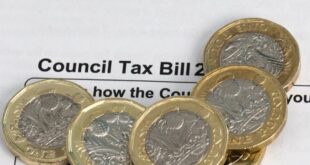— This is the script of CNBC’s financial news report for China’s CCTV on September 23, 2022.
The Bank of England hiked interest rates by 50 basis points. This is seen as conservative, but the market understands the Bank’s “wait and see” attitude ahead of the new government’s fiscal measures.
Since interest rates in the UK are not rising as fast as in the US, the main task of preventing a recession falls on the UK fiscal policy. With the Truss government’s focus on capping energy prices and cutting taxes sharply to preserve economic growth, analysis suggests that there is growing tension between the UK’s expansionary fiscal policy and the monetary policy that should be adopted, given that the level of inflation in the UK is currently five times higher than the 2% target inflation.
The pound has fallen sharply against the dollar so far this year. And if the U.S. and other European countries continue to aggressively raise interest rates in the coming months, the Bank of England can not follow suit in tandem, then the market expects the pound will continue to sink.
And if the energy crisis deepens this winter and the government’s fiscal pressures become too great, some analysts predict that there is a risk of parity between the pound and the dollar, or even parity with the euro.
Truss government in the fight against inflation of the new policy it takes some time to work
On the other hand, from the perspective of people’s livelihood, the Truss government’s new policy in the fight against inflation will take some time to work, following the previous university teachers, railroad workers, and Royal Mail employees repeatedly strike for a pay rise, many other industries have recently announced new strike dates.
40,000 railroad workers will strike on October 8, and 2,000 bus drivers in north London will strike on October 4. In addition, nurses, doctors, and teachers are also preparing to strike to address pay issues. But Kirkegaard, a senior fellow at the Peterson Institute for International Economics, feels that the new deal may solve labor risks in the short term, but in the long term, it could lead to a loss of investor confidence.
Jacob Kirkegaard
Senior Fellow of Peterson Institute for International Economics (PIIE), a U.S. think tank
“I’m more see the risks are in a slightly longer time horizon, that markets simply lose faith in the ability of the UK government to continue to serve as these very large outlays and that is going to give you if you like, a run on the pound, I think that’s the real risk and that’s the gamble that’s being taken.”
Looking at the whole of Europe from the UK, countries are actually facing inflationary pressures from the energy crisis and US interest rate hikes. This chart shows the CPI trend of some European countries, you can see that since 2022 are rising sharply.
To fight inflation, several European central banks have raised interest rates this week, the most notable of which is the Swiss central bank, which raised interest rates by 75 basis points, ending a negative interest rate policy that has lasted for eight years. This also means the era of negative interest rates in Europe is set to end.
Source link


